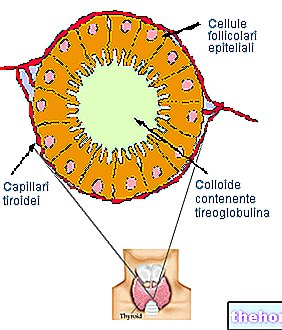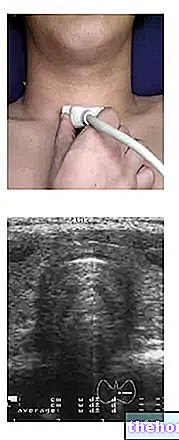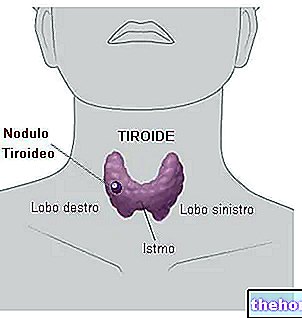Generality
Cushing's syndrome is a complex of signs and symptoms generated by chronic exposure to high levels of glucocorticoids, hormones produced by our body and used in the treatment of inflammatory diseases. Cushing's syndrome can therefore be supported by endogenous factors (excessive synthesis of glucocorticoids ) or, much more commonly, by exogenous factors (treatment with corticosteroids, such as prednisone, prednislone, betamethasone, etc.).

To learn more about the physiological action of these adrenal hormones and the drugs that mimic their action, consult the articles on the site dedicated to corticosteroids and cortisone.
Causes
As anticipated, the endogenous forms of Cushing are rare (2.5-6 cases per million population), have a slow onset and are often difficult to diagnose. More common in women (F: M 8: 1), from the point of pathogenetic view are classically divided into two variants: ACTH dependent (80%) and ACTH independent (20%).
ACTH, or adrenocorticotropic hormone, is produced by the pituitary as a stimulus to the adrenal synthesis of corticosteroid hormones (glucocorticoids and mineralocorticoids); a benign tumor of this gland (pituitary adenoma) is present in about 80% of the cases of endogenous ACTH-dependent Cushing, while in the remaining 20% of cases non-pituitary tumors (usually pulmonary) that produce ACTH occur, causing Cushing's syndrome , so-called "ectopic".
60% of the independent endogenous ACTH forms are supported by an adrenal adenoma, while in the remaining cases the syndrome is triggered by the presence of an adrenal carcinoma.
In most cases, Cushing's syndrome is caused by the excessive and prolonged administration of cortisone drugs (Cushing iatrogenic ACTH independent), while iatrogenic forms of therapy with ACTH (Cushing iatrogenic ACTH dependent) are rare.
Symptoms
For further information: Cushing's Syndrome Symptoms
The signs and symptoms (see figure) are of variable entity and variously associated with each other. Sometimes the disease presents with the characteristics of the metabolic syndrome or with a partial or nuanced clinical picture. If you think you have symptoms of Cushing's Syndrome, contact your doctor to determine the cause in collaboration with an endocrinologist, but do not for any reason stop taking cortisone therapy on your own initiative.
Diagnosis and treatment
For further information: Medicines for the treatment of Cushing's syndrome
Although the diagnosis of a full-blown picture is quite easy, very often, especially in the endogenous forms, it can be difficult. In the presence of a suspicion deriving from the "physical examination of the patient, the diagnosis of Cushing's syndrome is confirmed by the presence of elevated levels of cortisol, which can be measured in the blood, in the urine collected in 24 hours or in the saliva. In the latter" case the sample is collected around midnight, the time of day when cortisol levels in healthy people are quite low. Clinical tests are also performed after the administration of suppressants, such as dexamethasone, or hormonal stimulators (such as ACTH); it is also possible to evaluate plasma levels of adrenocorticotropic hormone to highlight the forms caused by the hypersecretion of ACTH.
In addition to clinical examinations, instrumental investigations are often required, such as a CT scan or magnetic resonance imaging to assess the appearance of the adrenal and pituitary glands.
The treatment of Cushing's syndrome is subject to a correct identification of its origins. In the iatrogenic forms, the most frequent, the doctor generally opts for a gradual reduction of doses or for the interruption of treatment in favor of alternative therapies. The primary forms of tumor origin can be resolved by surgery or radiation therapies. In some patients suffering from Cushing's syndrome, for example waiting or preparing for surgery or when this is not feasible, it is necessary to use drugs that reduce the production of cortisol, such as Ketoconazole and Mitotane.









.jpg)


















